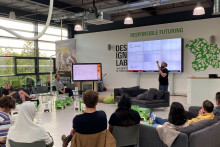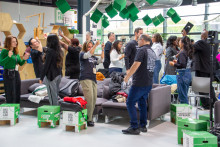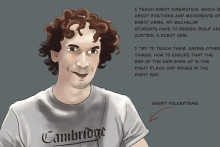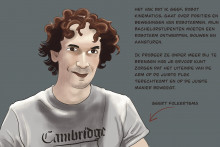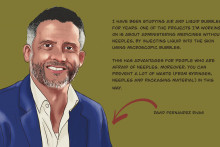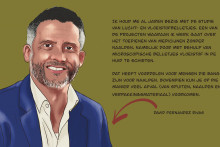The event, attended by about twenty interested guests, provided an opportunity to explore and discuss what education for the future is and how it can be delivered at this university.
Critical thinking
Nelly Litvak, UT professor of algorithms for complex networks and last year’s ‘Teacher of the Year’, was the first speaker to talk about the topic. Litvak considered that one problem of education at the UT is that students are not able to think critically. ‘We want to teach them critical thinking, but I think that's what's missing in education today. Normally, as teachers, we assume that students learn critical thinking by taking exams and attending lectures, which is not working out. To improve critical thinking, students need to learn why they are learning something, they should also be able to discuss answers and make mistakes and feel confident doing so.’
To address this in her courses, Litvak relies on assignments: ‘In my course, I try to offer material in advance and use the class as a discussion opportunity. The material consists of mandatory assignments that are not graded.’ Litvak was optimistic about the future of education. ‘I hope that the future of education is bright, but that is only possible if we achieve education in an honest and efficient way.’
Transdisciplinary education
Klaasjan Visscher is an associate professor at the UT and programme director of the prize-winning master-insert ‘Shaping Responsible Futures’. He mentioned what the purpose of education is for him. ‘We have countless societal problems, and we need to educate students to solve these problems.’ He emphasized that these challenges are very multifaceted. To address them, he argued that expertise in one area is not enough. ‘In-depth knowledge in certain areas of science is important, but you can never address these challenges with expertise in one area alone.’
Therefore, he suggested that people from different fields of science should work together. This is where his vision for transdisciplinary education came in. ‘The goal of transdisciplinary education is to train students who can contribute to complex societal challenges, by developing their skills outside the comfort zones of their disciplines.’ Ultimately, this type of education is about students making a difference. ‘The goal is not just to prepare you for future jobs after graduation, but also to make a difference while you're still studying; to do things that matter in these projects.’
No teachers, no lectures
David Giron is the director of Codam in Amsterdam, a school for software engineering, and has a completely different, for many revolutionary, view on education. ‘We have no teachers and no lectures in our school.’ In his model, education is about mastering problems, which is why teachers are not needed, he explained. ‘We have realised that tackling a problem by acquiring knowledge is more important than lectures. For this reason, the students' work revolves around projects where problems are simulated.’
In his school there is also no staff to assess the projects. ‘The students grade each other for their projects. No one knows which student will grade their project because the grading is random. ‘An average is taken from these random assessments, which is then used as the grade. We have found that it is more important to acquire knowledge in some way than to focus on a particular form of education like lectures. In my idea of education, it is the teacher's job to create an environment that enables students to acquire knowledge from different sources.’
Improve the foundation of education
Giron’s education model in particular was discussed a lot by the audience. ‘I like Giron’s view a lot, but I don't think it would work outside of software engineering. There are many courses of study that require a large theoretical framework’, said one of the audience members. Giron replied: ‘I think our training methods can be used in different courses of study; it's just a matter of how you break the training down into parts that are useful for tackling problems.’ However, Giron did recognize that there are limitations to his model. ‘When it comes to degree programmes that are more expensive because of equipment, for example, our model is not applicable.’
One audience member responded to this statement, saying: ‘I think the cost of this education model could be reduced by finding sponsors to pay for equipment in return for well-trained graduates.’ ‘We've heard a lot about higher education today’, added another student. ‘I think we should focus not only on meaningful education at the university level, but starting at the elementary school level, so that we improve the foundation of education at a young age.’


